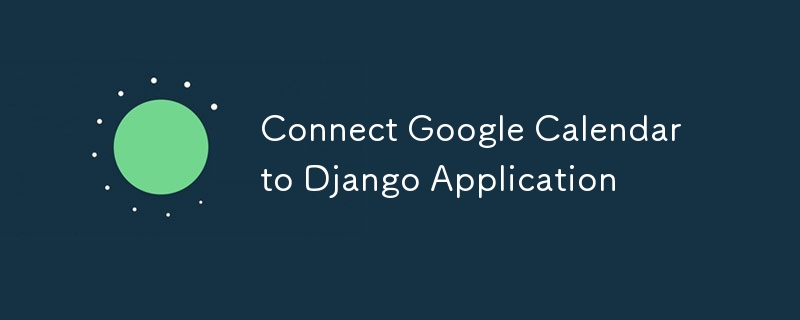將 Google 日曆連接到 Django 應用程式

将 Google 日历与 Django 应用程序无缝集成以增强日程安排和事件管理的分步指南。
将 Google 日历与您的 Django 应用程序集成可以通过启用日程安排、事件管理和日历同步来显着增强您的 Web 应用程序的功能。本指南将引导您完成将 Google 日历连接到 Django 应用程序的步骤,涵盖从设置 Google API 凭据到在 Django 中实现必要代码的所有内容。
先决条件
开始之前,请确保您具备以下条件:
1. Django 应用程序: 一个工作的 Django 应用程序。
2. Google API 控制台帐户: 访问 Google Cloud Console。
3.已启用 Google Calendar API: 应在 Google Cloud Console 中为您的项目启用 Google Calendar API。
第 1 步:设置 Google Cloud 项目
1.创建项目:
转到 Google Cloud Console 并创建一个新项目。
2.启用 Google 日历 API:
导航至“API 和服务”>“库”并搜索“Google Calendar API”。为您的项目启用它。
3.配置同意屏幕:
- 导航至“API 和服务”>“OAuth 同意屏幕”并配置同意屏幕。
- 现在选择您想要的 OAuth 类型(在本例中为外部,因为拥有 Google 帐户的任何人都可以访问该应用程序)。
- 根据需要设置同意屏幕的所有数据,如应用程序名称、徽标、支持电子邮件等。
- 点击“添加或删除范围”并添加以下范围,…/auth/userinfo.email、…/auth/userinfo.profile、用于访问用户信息的 openid 以及用于访问 Google 日历的所有 Google Calendar API 范围用户的。然后点击更新保存。
- 下一步添加测试用户。由于我们的应用程序尚未经过谷歌验证,因此只有此列表中的用户才能注册到此谷歌项目。因此,请添加您将用于测试 Google 日历集成的所有测试电子邮件。 完成后继续创建凭据。
4。创建 OAuth 凭据:
转到“API 和服务”>“凭据”并创建凭据。选择 OAuth 客户端 ID 作为凭据类型。将Web应用程序设置为应用程序类型并填写应用程序详细信息。
- 授权重定向 URI:添加 Django 应用程序的重定向 URL(例如,用于本地开发的 http://localhost:8000/oauth2callback)。
5。下载 JSON 凭证:
下载 OAuth 2.0 凭据 JSON 文件并妥善保管。该文件包含您的 client_id、client_secret 和其他重要信息。
第2步:安装所需的Python包
您需要一些 Python 包才能与 Google API 交互:
pip install google-auth google-auth-oauthlib google-auth-httplib2 google-api-python-client
第 3 步:配置 Django 设置
使用以下内容更新您的 settings.py:
import os # Google Calendar API GOOGLE_CLIENT_SECRETS_FILE = os.path.join(BASE_DIR, 'path/to/client_secret.json') GOOGLE_API_SCOPES = ['https://www.googleapis.com/auth/calendar'] REDIRECT_URI = 'http://localhost:8000/oauth2callback' # Or your production URL
第 4 步:创建 OAuth2 流程
创建一个视图来处理 OAuth2 流程:
from google.oauth2.credentials import Credentials
from google_auth_oauthlib.flow import Flow
from django.shortcuts import redirect
from django.http import HttpResponse
from django.conf import settings
def google_calendar_init(request):
flow = Flow.from_client_secrets_file(
settings.GOOGLE_CLIENT_SECRETS_FILE,
scopes=settings.GOOGLE_API_SCOPES,
redirect_uri=settings.REDIRECT_URI
)
authorization_url, state = flow.authorization_url(
access_type='offline',
include_granted_scopes='true'
)
request.session['state'] = state
return redirect(authorization_url)
def google_calendar_redirect(request):
state = request.session['state']
flow = Flow.from_client_secrets_file(
settings.GOOGLE_CLIENT_SECRETS_FILE,
scopes=settings.GOOGLE_API_SCOPES,
state=state,
redirect_uri=settings.REDIRECT_URI
)
flow.fetch_token(authorization_response=request.build_absolute_uri())
credentials = flow.credentials
request.session['credentials'] = credentials_to_dict(credentials)
return HttpResponse('Calendar integration complete. You can now use Google Calendar with your Django app.')
def credentials_to_dict(credentials):
return {'token': credentials.token,
'refresh_token': credentials.refresh_token,
'token_uri': credentials.token_uri,
'client_id': credentials.client_id,
'client_secret': credentials.client_secret,
'scopes': credentials.scopes}
第 5 步:处理 Google 日历 API 请求
OAuth2 流程完成后,您可以向 Google Calendar API 发出经过身份验证的请求。这是一个列出用户日历事件的简单示例:
from googleapiclient.discovery import build
def list_events(request):
credentials = Credentials(**request.session['credentials'])
service = build('calendar', 'v3', credentials=credentials)
events_result = service.events().list(calendarId='primary', maxResults=10).execute()
events = events_result.get('items', [])
return HttpResponse(events)
第 6 步:更新 URL
在 urls.py 中添加视图的 URL:
from django.urls import path
from . import views
urlpatterns = [
path('google-calendar/init/', views.google_calendar_init, name='google_calendar_init'),
path('oauth2callback/', views.google_calendar_redirect, name='google_calendar_redirect'),
path('google-calendar/events/', views.list_events, name='list_events'),
]
第 7 步:运行和测试
启动您的 Django 服务器:
使用 python manage.py runserver. 运行 Django 开发服务器
验证:
在浏览器中导航至 /google-calendar/init/。您将被重定向到 Google 的 OAuth2 同意页面。访问事件:
身份验证后,前往 /google-calendar/events/ 查看您的 Google 日历活动。
结论
将 Google 日历与 Django 应用程序集成后,您可以直接在应用程序中构建强大的日程安排功能。通过遵循本指南,您已经设置了 OAuth2 身份验证、连接到 Google Calendar API 并获取了日历事件。您现在可以根据需要扩展此集成以包括事件创建、更新和其他日历管理功能。
PS:请记住安全地处理凭据并确保正确的错误处理以实现强大的应用程序。
-
 限制 Laravel 模型上的急切載重關係介紹 有時,當您渴望在 Laravel 模型上載入關係時,您可能想要限制返回的相關模型的數量。 例如,在部落格平台上,您可能想要載入系統中的每位作者及其三篇貼文。 在 Laravel 的舊版本中,限制急切加載的關係是一項有點繁瑣的任務。我從來沒有真正找到一種感覺正確的優雅方式來...程式設計 發佈於2024-11-07
限制 Laravel 模型上的急切載重關係介紹 有時,當您渴望在 Laravel 模型上載入關係時,您可能想要限制返回的相關模型的數量。 例如,在部落格平台上,您可能想要載入系統中的每位作者及其三篇貼文。 在 Laravel 的舊版本中,限制急切加載的關係是一項有點繁瑣的任務。我從來沒有真正找到一種感覺正確的優雅方式來...程式設計 發佈於2024-11-07 -
 如何使用 GDB 在 C++ 中列印向量元素?透過GDB 在C 中列印向量元素在GDB 中調試C 程式碼時,檢查std::vector 的內容可能具有挑戰性。例如,考慮一個名為 myVector 的 std::vector。我們如何有效地印製它的元素? 在 GCC 4.1.2 中,解決方案涉及存取向量的內部指標 myVector._M_impl...程式設計 發佈於2024-11-07
如何使用 GDB 在 C++ 中列印向量元素?透過GDB 在C 中列印向量元素在GDB 中調試C 程式碼時,檢查std::vector 的內容可能具有挑戰性。例如,考慮一個名為 myVector 的 std::vector。我們如何有效地印製它的元素? 在 GCC 4.1.2 中,解決方案涉及存取向量的內部指標 myVector._M_impl...程式設計 發佈於2024-11-07 -
 如何在不同瀏覽器中自訂下拉清單寬度?IE 下拉清單寬度修改在Internet Explorer 中,下拉清單鏡像其保管箱的寬度,而在Firefox 中,它會適應內容。此限制需要擴展保管箱以容納最長的選擇,從而導致網頁美觀不美觀。 基於CSS 的可變寬度解決方案要克服此問題,使用CSS 允許下拉框和下拉列表使用不同的寬度,請考慮以下事項...程式設計 發佈於2024-11-07
如何在不同瀏覽器中自訂下拉清單寬度?IE 下拉清單寬度修改在Internet Explorer 中,下拉清單鏡像其保管箱的寬度,而在Firefox 中,它會適應內容。此限制需要擴展保管箱以容納最長的選擇,從而導致網頁美觀不美觀。 基於CSS 的可變寬度解決方案要克服此問題,使用CSS 允許下拉框和下拉列表使用不同的寬度,請考慮以下事項...程式設計 發佈於2024-11-07 -
 在 C++ 中格式化時如何右對齊輸出字串?在C 中透過右對齊格式化輸出字串處理包含資料(例如座標)的文字檔案時,需要對齊列中的項目經常出現正確格式化的問題。在 C 中,輸出字串的操作對於實現這種對齊至關重要。本文解決了輸出字串右對齊的問題,提供了使用標準 C 技術的解決方案。 為了處理輸入文字文件,使用 line.split() 函數將每一...程式設計 發佈於2024-11-07
在 C++ 中格式化時如何右對齊輸出字串?在C 中透過右對齊格式化輸出字串處理包含資料(例如座標)的文字檔案時,需要對齊列中的項目經常出現正確格式化的問題。在 C 中,輸出字串的操作對於實現這種對齊至關重要。本文解決了輸出字串右對齊的問題,提供了使用標準 C 技術的解決方案。 為了處理輸入文字文件,使用 line.split() 函數將每一...程式設計 發佈於2024-11-07 -
 為什麼小型函數會讓你成為編碼英雄的原因嘿,代碼愛好者們! ?您是否曾經發現自己迷失在無盡的線條海洋中,想知道一個功能在哪裡結束,另一個功能從哪裡開始?我們都去過那裡。今天,我們來談談為什麼將程式碼分解成更小的、可管理的區塊不僅僅是一種最佳實踐——它還能改變你的開發技能和職業生涯。 1.未來的你會感謝你 想像一下:現在是...程式設計 發佈於2024-11-07
為什麼小型函數會讓你成為編碼英雄的原因嘿,代碼愛好者們! ?您是否曾經發現自己迷失在無盡的線條海洋中,想知道一個功能在哪裡結束,另一個功能從哪裡開始?我們都去過那裡。今天,我們來談談為什麼將程式碼分解成更小的、可管理的區塊不僅僅是一種最佳實踐——它還能改變你的開發技能和職業生涯。 1.未來的你會感謝你 想像一下:現在是...程式設計 發佈於2024-11-07 -
 JavaScript 變數名稱中美元符號的含義是什麼?為什麼在 JavaScript 變數名稱中使用美元符號? 提供的 JavaScript 程式碼包含一個名為「$item」的變量,該變數引發問題:變數名稱中美元符號的用途是什麼? 在 JavaScript 中,變數名稱前面的美元符號對於解譯器來說沒有特殊意義。它用作輕鬆識別包含 jQuery 物件的變...程式設計 發佈於2024-11-07
JavaScript 變數名稱中美元符號的含義是什麼?為什麼在 JavaScript 變數名稱中使用美元符號? 提供的 JavaScript 程式碼包含一個名為「$item」的變量,該變數引發問題:變數名稱中美元符號的用途是什麼? 在 JavaScript 中,變數名稱前面的美元符號對於解譯器來說沒有特殊意義。它用作輕鬆識別包含 jQuery 物件的變...程式設計 發佈於2024-11-07 -
 Laravel 中的授權 - 初學者指南掌握 Laravel 中的授權:Gates 與策略類別 ?? 在現代 Web 應用程式中,控制誰可以存取或修改資源至關重要。例如,在部落格應用程式中,您可能希望確保只有貼文的擁有者才能編輯或刪除它。 Laravel 提供了兩種優雅的方式來處理授權:Gates 和 Policy Cl...程式設計 發佈於2024-11-07
Laravel 中的授權 - 初學者指南掌握 Laravel 中的授權:Gates 與策略類別 ?? 在現代 Web 應用程式中,控制誰可以存取或修改資源至關重要。例如,在部落格應用程式中,您可能希望確保只有貼文的擁有者才能編輯或刪除它。 Laravel 提供了兩種優雅的方式來處理授權:Gates 和 Policy Cl...程式設計 發佈於2024-11-07 -
 Laravel 的枚舉報告 在我從事的一個專案中,有一個選擇欄位定義了不會更改的值。因此,為了列出此選擇中的項目,我決定建立一個枚舉類,然後描述這些值。但是,該項目需要支援英語和西班牙語,並且選擇選項的文本需要適應這一點,同時又不丟失對相應枚舉項的引用。換句話說,如果我選擇了“馬”這個項目,我需要係統知道這個項目仍然是“...程式設計 發佈於2024-11-07
Laravel 的枚舉報告 在我從事的一個專案中,有一個選擇欄位定義了不會更改的值。因此,為了列出此選擇中的項目,我決定建立一個枚舉類,然後描述這些值。但是,該項目需要支援英語和西班牙語,並且選擇選項的文本需要適應這一點,同時又不丟失對相應枚舉項的引用。換句話說,如果我選擇了“馬”這個項目,我需要係統知道這個項目仍然是“...程式設計 發佈於2024-11-07 -
 \“模組 vs 主要:現代英雄 vs package.json 的復古傳奇!\”什麼是模組字段? package.json 中的 module 欄位指定 ESM(ES6 模組) 的入口點。與為CommonJS 模組(require()) 設計的main 欄位不同,模組用於支援較新的ESM 標準的目標環境,例如JavaScript 捆綁程式(Webpack、Ro...程式設計 發佈於2024-11-07
\“模組 vs 主要:現代英雄 vs package.json 的復古傳奇!\”什麼是模組字段? package.json 中的 module 欄位指定 ESM(ES6 模組) 的入口點。與為CommonJS 模組(require()) 設計的main 欄位不同,模組用於支援較新的ESM 標準的目標環境,例如JavaScript 捆綁程式(Webpack、Ro...程式設計 發佈於2024-11-07 -
 如何在 CSS 檔案中實現類似變數的行為?CSS 檔案中的變數宣告並使用在 CSS 中,通常需要在整個樣式表中重複使用特定值。雖然沒有明確的變數聲明語法,但有一些技術可以實現此功能。 一種方法是利用 CSS 選擇器和樣式規則。將相關樣式組合在單一規則下,您可以避免重複,同時澄清每種樣式的範圍。例如:/* Theme color: text ...程式設計 發佈於2024-11-07
如何在 CSS 檔案中實現類似變數的行為?CSS 檔案中的變數宣告並使用在 CSS 中,通常需要在整個樣式表中重複使用特定值。雖然沒有明確的變數聲明語法,但有一些技術可以實現此功能。 一種方法是利用 CSS 選擇器和樣式規則。將相關樣式組合在單一規則下,您可以避免重複,同時澄清每種樣式的範圍。例如:/* Theme color: text ...程式設計 發佈於2024-11-07 -
 如何在 PHP 中編寫基本函數來從文字中刪除表情符號?用 PHP 編寫一個簡單的 removeEmoji 函數處理線上文字通常需要刪除表情符號,特別是在 Instagram 評論等情況下。本文探討了針對這種需求的解決方案,利用 PHP preg_replace 函數來有效地消除給定文字中的表情符號。 removeEmoji 函數利用一系列正規表示式來匹...程式設計 發佈於2024-11-07
如何在 PHP 中編寫基本函數來從文字中刪除表情符號?用 PHP 編寫一個簡單的 removeEmoji 函數處理線上文字通常需要刪除表情符號,特別是在 Instagram 評論等情況下。本文探討了針對這種需求的解決方案,利用 PHP preg_replace 函數來有效地消除給定文字中的表情符號。 removeEmoji 函數利用一系列正規表示式來匹...程式設計 發佈於2024-11-07 -
 Slim 和 Flight PHP 框架比較为什么要使用微框架? 在社交媒体上,新的 PHP 开发人员经常会问“我的项目应该使用什么框架”,通常给出的答案是“Laravel”或“Symfony”。 虽然这些都是不错的选择,但这个问题的正确答案应该是“你需要框架做什么?” 正确的框架应该能够满足您的需要,并且不会包含大量您永远...程式設計 發佈於2024-11-07
Slim 和 Flight PHP 框架比較为什么要使用微框架? 在社交媒体上,新的 PHP 开发人员经常会问“我的项目应该使用什么框架”,通常给出的答案是“Laravel”或“Symfony”。 虽然这些都是不错的选择,但这个问题的正确答案应该是“你需要框架做什么?” 正确的框架应该能够满足您的需要,并且不会包含大量您永远...程式設計 發佈於2024-11-07 -
 如何建立您的第一個 Python 遊戲:使用 PyGame 創建簡單射擊遊戲的逐步指南Hi lovely readers, Have you ever wanted to create your own video game? Maybe you’ve thought about building a simple shooter game where you can move ar...程式設計 發佈於2024-11-07
如何建立您的第一個 Python 遊戲:使用 PyGame 創建簡單射擊遊戲的逐步指南Hi lovely readers, Have you ever wanted to create your own video game? Maybe you’ve thought about building a simple shooter game where you can move ar...程式設計 發佈於2024-11-07 -
 為什麼我的 Java JDBC 程式碼在連接到 Oracle 時拋出“IO 錯誤:網路適配器無法建立連線”?診斷Oracle JDBC「IO 錯誤:網路適配器無法建立連線」嘗試使用JDBC 執行簡單的Java 程式碼時要連線到Oracle資料庫,您可能會遇到神秘的錯誤「IO 錯誤:網路適配器無法建立連線」。這個令人費解的消息源於 JDBC 驅動程式的模糊術語,並且可能由各種根本原因造成。以下是一些可能導致...程式設計 發佈於2024-11-07
為什麼我的 Java JDBC 程式碼在連接到 Oracle 時拋出“IO 錯誤:網路適配器無法建立連線”?診斷Oracle JDBC「IO 錯誤:網路適配器無法建立連線」嘗試使用JDBC 執行簡單的Java 程式碼時要連線到Oracle資料庫,您可能會遇到神秘的錯誤「IO 錯誤:網路適配器無法建立連線」。這個令人費解的消息源於 JDBC 驅動程式的模糊術語,並且可能由各種根本原因造成。以下是一些可能導致...程式設計 發佈於2024-11-07
學習中文
- 1 走路用中文怎麼說? 走路中文發音,走路中文學習
- 2 坐飛機用中文怎麼說? 坐飞机中文發音,坐飞机中文學習
- 3 坐火車用中文怎麼說? 坐火车中文發音,坐火车中文學習
- 4 坐車用中文怎麼說? 坐车中文發音,坐车中文學習
- 5 開車用中文怎麼說? 开车中文發音,开车中文學習
- 6 游泳用中文怎麼說? 游泳中文發音,游泳中文學習
- 7 騎自行車用中文怎麼說? 骑自行车中文發音,骑自行车中文學習
- 8 你好用中文怎麼說? 你好中文發音,你好中文學習
- 9 謝謝用中文怎麼說? 谢谢中文發音,谢谢中文學習
- 10 How to say goodbye in Chinese? 再见Chinese pronunciation, 再见Chinese learning

























